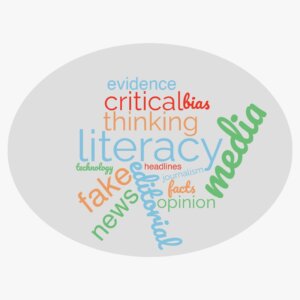
If it’s on the internet, it must be true, right? While most adults know that’s not the case, do children? Turns out, most kids don’t, despite having grown up with technology.[1] Over the last decade there has been a drastic increase in the amount of time young people spend with media, so it’s important for them to learn to control the media that surrounds them, rather than letting it control them.
We created a Civic Literacy and Media Influence (CLMI) fellowship program to do just that. Working with seasoned media professionals, students develop critical thinking skills about the media and learn how the media shapes our culture and society.
The 12-week course focuses on the fundamentals of journalism, editorial narrative, public policy, government and storytelling through experiential, project-based and lecture modules.
“I never understood how intentional media companies are about the information they share,” said Aspen A., who just completed a CLMI fellowship. “They want enticing headlines and stories that captivate audiences. People think that the most important stories are the exciting ones, which isn’t the case.”
Aspen learned that 48 percent of adults get their information mostly from social media.[2] “With a growing intricacy in news consumption, we are now seeing a prevalence of false and deceptive news,” she said. “It is critical that teens learn how to decipher facts from fiction in journalism and advocacy to ensure we are not being persuaded by inaccurate narratives.”
Aurora G. said the CLMI program acquainted her with valuable, reliable research sources. “They encouraged me to search for evidence-based data and less opinionated pieces, while informing me of the danger of misinformation and disinformation easily accessed through popular online search engines,” she explained. “Much of the world has transitioned to online-based information and recordkeeping, but not enough people know how to efficiently use, understand and translate the information handed to them online.”
The field of journalism has declined in recent years and is expected to shrink another nine percent in the next 30 years. Our CLMI program emphasizes the important role journalism plays as a watchdog for the public interest. Fortunately, media literacy programs like this have ignited some students’ interest in pursuing a career in journalism.
Aspen recalls a challenging assignment to write unbiased posts for the BE Note blog. “When you are passionate about a topic, you want to infuse your writing with your opinions,” she explained. “But the goal of informing people is to report facts without bias. I learned what language to use and to avoid. I now can tell when an article is deliberately leaning toward a certain opinion.”
[1] https://www.greatschools.org/gk/articles/raise-a-source-savvy-kid-in-the-age-of-fake-news-and-internet-hoaxes/
[2] https://www.pewresearch.org/journalism/2021/09/20/news-consumption-across-social-media-in-2021/

